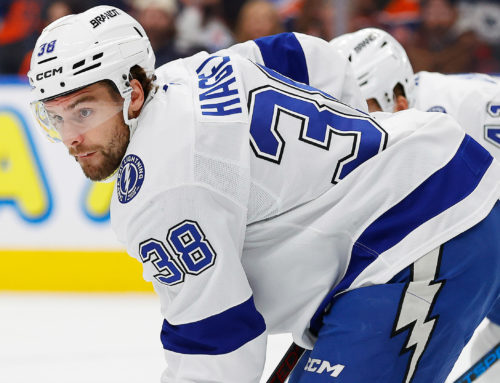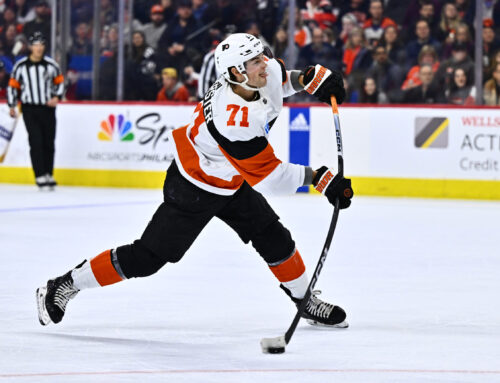In this week's Eastern Edge, we'll look at each team's fantasy MVP from the second half. Since I released my list of first-half MVPs on January 25th, the 'second half' referred to in this article runs from January 25th to May 1st.
When I think about value in fantasy hockey, I think about players who have outperformed expectations. So, this article isn't necessarily a list of each team's best player or leading scorer. I tried to consider players whose contributions outweighed their preseason/first-half acquisition cost. Without further ado, here’s each team’s fantasy MVP from the second half!
Boston Bruins – Erik Haula
As a candidate for the role of second-line center in Boston, Haula was a fringe sleeper pick in fantasy leagues this season. Fantasy managers saw how well Taylor Hall and David Krejci – the team's previous second-line center – played together last year and saw potential for Haula to produce beside Hall this season. Unfortunately, Haula's fantasy value fell during the first half as he posted just 15 points in his first 38 games with the Bruins. He surprised many with his second-half resurgence, posting 29 points in his final 40 outings as he found chemistry beside Hall and David Pastrnak.
Buffalo Sabres – Tage Thompson
The 24-year-old forward closed out his breakout campaign in style, maintaining a point-per-game pace down the stretch with 24 goals and 16 assists in his final 40 appearances. Across the entire league, only eight players scored more goals than Thompson during the second half. It's crazy to think that he went undrafted in most fantasy leagues and was probably sitting on your league's waiver wire at some point this season.
Carolina Hurricanes – Jordan Staal
None of Carolina's big names had particularly impressive showings during the second half, so I thought this would be a good opportunity to recognize Jordan Staal. The veteran center turned back the clock with an impressive 59-point pace last season, but struggled out of the gate this year, tallying just 10 points in his first 36 games (0.28 points per game). He bounced back in the second half, posting 26 points in his final 42 appearances (0.62 points per game).
Columbus Blue Jackets – Patrik Laine
After a career-worst performance that saw him score 0.52 points per game during the 2020-2021 campaign, Laine bounced back in a big way this year. His resurgence was especially noticeable during the second half as he closed out the campaign with 41 points in his final 36 outings, leading his team in scoring down the stretch.
Detroit Red Wings – Jakub Vrana
After missing the first five months of the season while recovering from shoulder surgery, Vrana returned to the lineup and closed out the campaign with 19 points in 26 games. Since news of his surgery broke before the season began, Vrana went undrafted in many leagues, and was dropped in other leagues due to his extended absence. There's a good chance he was available on your league's waiver wire at some point this season. I'd say a waiver wire addition who scores at a 60-point pace is pretty darn valuable.
Florida Panthers – Mason Marchment
Florida's stars may have scored at impressive rates down the stretch, but those guys were also selected early during this year's fantasy drafts. As such, their impressive scoring rates were almost a requirement because of the high-value draft picks that were used to acquire them. In contrast, Mason Marchment was far from a household name heading into the season. He flew under the radar during the first half, posting a modest 11 points through 17 appearances. The second half is when he really made a name for himself, posting 36 points in his final 37 games of the campaign.
Montreal Canadiens – Cole Caufield
Caufield led the Habs in scoring during the second half, posting 22 goals and 13 assists for 35 points in his final 38 games. Across the league, only 15 players had more goals than Caufield during that stretch. It was an incredible bounce-back performance for the rookie, who started out with just one goal and seven assists in his first 29 games of the year. The coaching change that swapped Dominique Ducharme for Martin St. Louis is a well-documented catalyst for Caufield's rebound.
New Jersey Devils – Nico Hischier
We saw a few Devils break out this season. Jack Hughes is the most obvious one, as his breakout was well-documented. Jesper Bratt's breakout didn't receive the same level of recognition, but it was certainly acknowledged by those who follow the sport closely. However, from my perspective, captain Nico Hischier didn't receive much love this year despite scoring at a career-best 70-point pace. He had an especially strong showing in the second half, posting 36 points over his final 36 appearances.
New York Islanders – Noah Dobson
Dobson broke out with 37 points in 48 games during the second half of the season. Although he played more games than his fellow blueliners, it's worth recognizing that Dosbon ranked fifth in scoring among defenseman during the span we're analyzing (January 25th – May 1st). In addition, Victor Hedman (22) and Cale Makar (18) were the only defenders with more power-play points than Dobson (17) in the second half.
New York Rangers – Igor Shesterkin
Shesterkin was the best goalie in the NHL this season. He posted an excellent 36-13-4 record alongside a 2.07 GAA and .936 save percentage – leading the league in both of those metrics. When a player is drafted early in fantasy leagues, it's often difficult for them to meet – let alone outperform – the lofty expectations that come with being such a high pick. Shesterkin was consistently outstanding this season and was one of the few high-profile players who shattered lofty preseason expectations.
Ottawa Senators – Tim Stützle
The young forward had a modest start to his sophomore campaign, posting 19 points in his first 34 appearances of the season. He took his offensive game to another level in the second half, closing out the year with 39 points in 45 games. 17 of those points came with the man advantage as Stützle finished the season with a team-leading 26 power-play points.
Philadelphia Flyers – Kevin Hayes
There really wasn't a lot of fantasy value in Philadelphia this year, but Kevin Hayes should be commended for fighting through multiple injuries and surgical procedures to post 22 points in 28 games down the stretch. He led the team with 0.79 points per game during the second half.
Pittsburgh Penguins – Casey DeSmith
This may be a controversial selection because DeSmith didn't play very much during the second half. When he did play, he wasn't exactly racking up wins, posting a rather pedestrian 8-3-4 record down the stretch. The case against DeSmith gets even stronger when you consider that many of the Penguins offensive stars had strong showings in the second half and are arguably more deserving of this MVP title than DeSmith is. Regardless, I think Pittsburgh's backup netminder saw his fantasy value increase the most between the first and second half, so I decided to give him the team's fantasy MVP title. During the first half, he posted a hideous 3.58 GAA and .886 save percentage through nine games. Through 15 starts in the second half, he posted a 2.40 GAA and .927 save percentage– sitting in the top-10 for both metrics. In addition, when Tristan Jarry went down with an injury in the final weeks of the regular season, DeSmith posted strong numbers and helped managers navigate through the fantasy playoffs.
Tampa Bay Lightning – Steven Stamkos
This was a tough choice because both Nikita Kucherov and Steven Stamkos posted 1.44 points per game during the second half. Across the league, only six players posted a better point-per-game rate down the stretch. Ultimately, I gave the title to Stamkos because he was drafted later than Kucherov in most fantasy leagues, so I'd say he outperformed expectations by a wider margin. In addition, Stamkos led the league in scoring during the month of April, posting 33 points in 16 games and coming in clutch for the fantasy playoffs. For what it's worth, Kucherov was right behind him with 31 points in the same number of games.
Toronto Maple Leafs – Auston Matthews
Matthews tallied 35 goals and 30 assists during the second half of the season, totalling 65 points in his final 38 games. He was averaging 0.92 goals per game down the stretch, while the rest of the league's top scorers were averaging 0.60 to 0.70 goals per game – which is still impressive, but nowhere near the level that Matthews was on. Not only did he lead the league in goals per game during the second half, he also led the league in points per game (1.71).
Washington Capitals – Evgeny Kuznetsov
Hindered by COVID last season, Kuznetsov scored at a disappointing 58-point pace. His fantasy value plummeted as his production had been on the decline for the past few seasons. Fortunately, Kuznetsov bounced back in a big way this year, tallying 78 points through 79 games to finish 38th in league scoring, outperforming his ADP (average draft position) of 68. He posted 37 points in 39 games during the second half.





 FLA
FLA CHI
CHI NYR
NYR PIT
PIT L.A
L.A COL
COL MTL
MTL CAR
CAR CBJ
CBJ NSH
NSH PHI
PHI SEA
SEA
